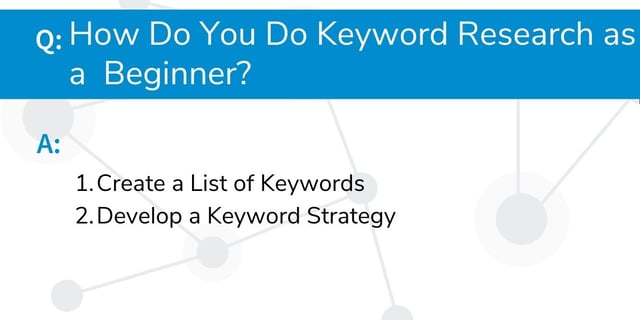How to Simplify Keyword Research and Stop Wasting Valuable Time
November 11, 2021 •DJ Team

Search engine optimization, or SEO, is the practice of creating content that will intentionally rank higher when potential customers search for a product or service online.
Since its inception in the early 21st century, SEO has been shrouded by a cloud of mystery. Although it was common knowledge that SEO was related to how content ranks on Google’s homepage, marketers and businesses threw the term around without fully understanding how it worked or what it was. As technology advanced and the internet evolved, SEO did too.
Today, companies’ understanding of SEO has evolved dramatically. With that increased knowledge, SEO has become a marketing staple for businesses large or small trying to increase their reach.
Whether you are a member of an internal marketing team, an ad agency, or an SEO-specific company, SEO is a key to organic growth, sustained engagement, and overall credibility with the customer.
When it comes to SEO and high rankings, the secret sauce boils down to keywords. Keywords are the phrases or questions that people are searching for, and they inform search engines of how to rank content.
For example, if the SEO keyword is “How to make apple pie,” that means when people are searching for apple pie recipes and instructions, that is often how they are asking. The content that includes that phrase and provides other similar content is more likely to rank higher on the search results page.
So let’s say your company wants to improve its SEO ranking to generate more traffic to the website. You will need to include the right keywords in their content. To do so, you will have to conduct SEO keyword research.

Is Keyword Research Hard?
Keyword research is a critical part of optimizing your search engine ranking. That begs the question, is it hard to do? The short answer is, it can be.
For the long answer, we have to look at how keyword research can be accomplished, and dig a little deeper into the process as a whole.
How Do You Do Keyword Research for Beginners?
If you are new to keyword research you may be asking yourself “What are the steps to perform keyword research?” or “What is the keyword research process?”
Good questions. For beginners looking to do keyword research, it’s important to start off by establishing a keyword list and a keyword strategy.

Step One: Creating a List of Keywords
Creating a keyword list should be the first step. To do so, you will need to compile a list of short-tail, mid-tail, and long-tail phrases. The point of varying the length of your keywords is to broaden your reach as much as possible and strengthen your potential ranking.
There are all sorts of platforms and tools available to help you identify these keyword phrases:
- Google: This is a great place to start. Every time you type something into Google, you are actually experiencing SEO firsthand. Based on what you type, you are seeing the results Google is ranking highest based on keywords. So, if you want to see what things rank highly for your company or industry, try Googling it. The results will show you what people are searching for.
Another nuance to using Google is that when you scroll down the page a little bit and see the “people also asked” suggestions, Google is essentially saying: when people search for your keyword, they also end up searching for and or looking at these keywords too, making the search engine a great place to begin compiling your list of keywords.
- Keyword Generators- An alternative approach is to use a keyword generator. Self-explanatory, a keyword generator, like DemandJump’s Keyword Research Tool, produces a list of keywords that are related to your topic.
Step Two: Developing a Keyword Strategy
After you get a list of keywords, it’s important to develop a strategy on how to best use them. Otherwise, all the investment you did to find those keywords may have been in vain.
Since SEO is inherently competitive, to outrank your competition you will want to identify which keywords represent the biggest opportunity for your business. In theory, these keywords will be informed by what your competitors are ranking for and where they are targeting their efforts.
For more on specific tools that can help you gain these insights, check out our blog on the best keyword tools to use.
Can I Do Keyword Research for Free?
One other component to the difficulty of SEO keyword research is the cost of it. Technically, you can conduct keyword research without paying a single penny by using free and freemium tools, but it’s not quite as straightforward as that.
Consider the energy and resources associated with keyword research. These include the time and effort to essentially learn a new skill. Not to mention the hours of actual research you’ll need to do on a daily or weekly basis.
When you consider these factors, while it can be done free of charge, there are still some investments associated with keyword research.
Further investment may be necessary because to get the best keywords and strategies, you need to use premium tools that come at a cost. So yeah, technically you could do keyword research for free, but it might not be worth doing.
Keyword Research Doesn’t Have to Be Hard
So, back to the main question of this blog, is keyword research hard?
It still depends. It can be hard for beginners trying to learn the ropes. It can be costly, and if done incorrectly, for no real benefits. It can be difficult to piece together the puzzle with just free tools.
But it doesn’t have to be hard.
With DemandJump, we have automated keyword research. We know the expected challenges and the best strategies to generate high-ranking content. The tool provides content outlines with all the keywords you will need.
DemandJump is your all-in-one solution to help create high-ranking content, fast. Get started today!
Featured Articles
Categories
- Attribution Tracking (13)
- Channel Optimization (11)
- Consumer Insights (68)
- Content Marketing (251)
- Data Science (8)
- Digital Marketing (6)
- Digital Transformation (26)
- Enterprise (10)
- Lead Generation (14)
- Market Intelligence (8)
- Marketing Analytics (39)
- Marketing Attribution (57)
- Marketing Management (153)
- Marketing Operations (86)
- Organic Search (222)
- Paid Search (52)
- Pillar-Based Marketing (63)
- Programmatic Advertising (9)
- SaaS Content (14)
- SaaS Marketing (29)
- Search Marketing (111)
- SEO Keyword Research (28)
- SEO Pillar (18)
- SEO Strategy (46)
- SMB (5)
- Website Content (12)


